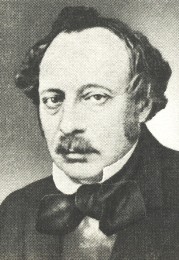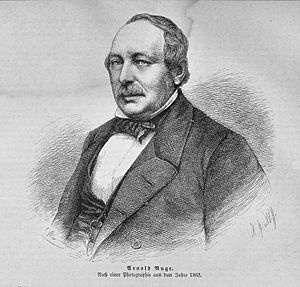Arnold Ruge facts for kids
Quick facts for kids
Arnold Ruge
|
|
|---|---|
 |
|
| Born | September 13, 1802 Bergen auf Rügen, Swedish Pomerania, Holy Roman Empire
|
| Died | December 31, 1880 (aged 78) |
| Nationality | German |
| Alma mater | Martin Luther University of Halle-Wittenberg University of Jena Heidelberg University |
Arnold Ruge (born September 13, 1802 – died December 31, 1880) was an important German writer and thinker. He was interested in philosophy and politics. He was also the older brother of Ludwig Ruge.
Contents
Early Life and Studies
Arnold Ruge was born in a town called Bergen auf Rügen. He went to different universities to study. These included the University of Halle, the University of Jena, and the University of Heidelberg.
He strongly believed that Germany should be free and united. Because of his strong beliefs, he took part in student protests between 1821 and 1824. This led to him being put in prison. He was held in the Kolberg fortress from 1824 to 1830. Even in prison, he kept learning. He studied the works of ancient Greek thinkers like Plato and Greek poets.
After he was released, Ruge moved to Halle. There, he wrote several plays and translated ancient Greek texts. One of his plays was called Schill und die Seinen. He also translated Oedipus at Colonus from Greek. In 1832, he became a university lecturer at the University of Halle.
Ideas and Writings
Arnold Ruge became part of a group of thinkers known as the Young Hegelians. These were followers of a famous philosopher named Hegel. In 1837, Ruge started a magazine with E. T. Echtermeyer. It was called Hallesche Jahrbücher für deutsche Kunst und Wissenschaft. In this magazine, they wrote about important issues of the time. They looked at these issues through the ideas of Hegel's philosophy.
Ruge believed that history was a journey towards more freedom. He thought that true freedom could be found in a well-organized country. However, he also felt that Hegel's ideas didn't leave enough room for new things to happen in the future.
The government in Prussia did not like Ruge's magazine. In 1843, the government in Saxony stopped it from being published. After this, Ruge moved to Paris, France.
In Paris, Ruge briefly worked with Karl Marx. They started a magazine together called Deutsch–Französische Jahrbücher. But Ruge and Marx had very different ideas about society. Ruge did not agree with Marx's ideas about socialism. So, Ruge soon left the magazine and Marx. In 1845, Ruge left Paris. He went to Switzerland and then became a bookseller in Leipzig, Germany.
The Revolutions of 1848
In 1848, many revolutions happened across Europe. Ruge was very active in these events in Germany. He led the most radical group in the Frankfurt parliament. This was a meeting where people tried to create a united Germany. For a while, he lived in Berlin and edited a newspaper called Die Reform.
Ruge supported the demands of the Polish people during the revolution. He believed that if their demands were not met, it could lead to bigger problems with Slavic groups.
The Prussian government stepped in, and Ruge had to leave Germany again. He went back to Paris. He hoped to connect German and French republicans through his friend Alexandre Ledru-Rollin. But in 1849, both Ruge and Ledru-Rollin had to seek safety in London.
Life in England
In London, Ruge joined a group called the "European Democratic Committee." This group included other important political thinkers like Giuseppe Mazzini. However, Ruge soon left this committee.
In 1850, Ruge moved to Brighton, a town in England. He worked there as a teacher and writer. Later in his life, he supported Germany in two wars. In 1866, he supported Prussia against Austria in the Austro-Prussian War. In 1870, he supported Germany against France in the Franco-Prussian War.
In Brighton, he was also the chairman of the successful Park Crescent Residents' Association. This shows he was active in his local community. In his final years, starting in 1877, the German government gave him a pension. Arnold Ruge passed away in Brighton in 1880.
His Writings
Arnold Ruge was a leading voice for liberal ideas in religion and politics during his time. Between 1846 and 1848, his collected writings were published in ten volumes.
He wrote many other books, including:
- Manifest an die deutsche Nation (1866)
- Geschichte unserer Zeit (1881)
- Unser System
- Revolutionsnovellen
- Die Loge des Humanismus
- Aus früherer Zeit (his memoirs, published 1863–67)
He also wrote many poems, plays, and stories. He translated several English books into German. These included the Letters of Junius and Buckle's History of Civilization. His personal Letters and Diary (from 1825–80) were published after his death.
See also
 In Spanish: Arnold Ruge para niños
In Spanish: Arnold Ruge para niños
 | Kyle Baker |
 | Joseph Yoakum |
 | Laura Wheeler Waring |
 | Henry Ossawa Tanner |


